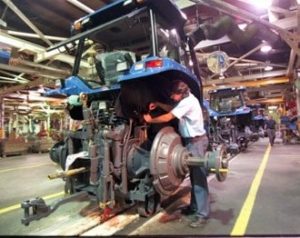 When you’re producing agricultural machinery, you need the right components to go into it. Today, farming machinery has becoming much more sophisticated—with motorized equipment that needs custom springs, like torsion springs, for specific requirements. This means that you need a true specialist in torsion spring manufacturing to get you the right product for your equipment. Whether you’re producing balers, mowers, tillers, seeders, plows, tractors, sprayers, cultivators or other heavy-duty agricultural equipment, the torsion springs that go into your products need to be strong and resilient to ensure optimal performance and safe use.
When you’re producing agricultural machinery, you need the right components to go into it. Today, farming machinery has becoming much more sophisticated—with motorized equipment that needs custom springs, like torsion springs, for specific requirements. This means that you need a true specialist in torsion spring manufacturing to get you the right product for your equipment. Whether you’re producing balers, mowers, tillers, seeders, plows, tractors, sprayers, cultivators or other heavy-duty agricultural equipment, the torsion springs that go into your products need to be strong and resilient to ensure optimal performance and safe use.
The Right Design
The wrong torsion spring can make your equipment function ineffectively. In order to get the right spring for your product, you need the right design, the right specifications, and the right configurations. The diameter, shape, and length of your spring will make a difference for its intended use. For example, do you need a round, square, or rectangular wire for your agricultural equipment? Do you need bent, crooked, looped, or twisted ends? What’s more, the loading direction needs to be considered while designing a torsion spring’s legs and body in order to create favourable residual stresses. There are a lot of specifications to consider when choosing the right design for your springs.
When you find a manufacturer that is an expert in the field, he can help ensure you’re creating the right design for your custom equipment. What’s more, a supplier with prototyping abilities can allow you to test your new spring in your machinery before mass production, so you know it works.
The Right Quality Control and Processes
The times of simple spring manufacturing are long gone. Today, springs must be put through rigorous testing with state-of-the-art technology to ensure quality, precision, and endurance. Your torsion spring should go through a comprehensive analysis for metallurgical conditions—such as heat treating, corrosion resistance, high-temperature performance, vibration, and fatigue. If your torsion spring passes these tests, you can rest assured that you’ve found the right component for your agricultural needs.
The Right Material
Whether you’re looking for basic cuts or a more complex design, the quality of your torsion spring will rely heavily on the material used to create it—whether that’s carbon, pre-hardened alloys, stainless steel, or another material. Not all materials are right for every industrial use. The material you choose should be resilient to any weather conditions and ideally come with a certificate of analysis. The agricultural machinery’s performance depends on it.
High Quality for the Long Haul
Your torsion spring needs to be heavy duty, strong, and able to resist the arduous conditions of the environments in which they are used. You need precise springs to meet the tolerances required by your machinery. You cannot settle for small, weak, subpar springs. The right torsion spring will allow your equipment to work safely in any environment and last for the long haul. In order to find the right spring solution for your agricultural needs, you need a manufacturer with the knowledge, expertise, and craftsmanship to meet your company’s needs.
Worm Wire
Learn How Our Spring Design Helped Save an Automotive Company $100K+
